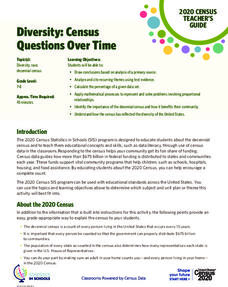Teaching Tolerance
The War on Drugs—Mechanisms and Effects
The war on drugs doesn't have definite results. An interesting instructional activity examines the social, political, and economic effect of the war on drugs. Academics learn how the war on drugs has led to mass incarcerations and...
Teaching Tolerance
Mass Incarceration as a Form of Racialized Social Control
Mass incarceration: A result of a tough stance on crime or racial discrimination, you decide. Academics explore the history and reasons behind mass incarcerations in the United States and its impact on ethnic communities. The...
Teaching Tolerance
Jim Crow as a Form of Racialized Social Control
Just because slavery was illegal doesn't mean it went away ... Jim Crow Laws took its place. An eye-opening lesson focuses on how Jim Crow Laws were used as a form of racial social control against African Americans in the United States....
Teaching Tolerance
Introducing 'The New Jim Crow'
When Jim Crow Laws ended, the intent behind them did not. Academics read "The New Jim Crow Laws" and an interview from the author to understand how racism has not ended, but rather changed over time. The lesson explains how prejudices in...
Teaching Tolerance
Talking About Race and Racism
Set the stage for discussion in a thought-provoking instructional activity on racism. An informative resource prepares scholars to discuss the history of race and racism with a quiz, vocabulary, and guidelines. Academics discuss topics...
Teaching Tolerance
Slavery as a Form of Racialized Social Control
An engaging lesson delves into the effects of slavery on society. Young historians read text excerpts, complete handouts, and participate in group discussion to understand how slavery was a means to control society and establish a racial...
Teaching Tolerance
Tweeting for Change
Do some good with social media. Secondary scholars participate in a live Twitter chat focusing on social justice issues. The thought-provoking activity allows academics to set up a live chat, create responses, and express their personal...
Teaching Tolerance
Puppet Show
It's a play, it's a story, it's a puppet show! A lively resource provides academics with a creative outlet to express their views on diversity and social justice. Scholars are responsible for writing, creating, and performing a puppet...
Constitutional Rights Foundation
Achieving Diversity: The Question of Affirmative Action in College Admissions
How can a college board of trustees both increase cultural and racial diversity and offer all incoming learners equal protection under the Fourteenth Amendment? Class members debate the question using readings about how colleges use...
Teaching Tolerance
Why Do We (Still) Celebrate Columbus Day?
What are we really celebrating on Columbus Day? The resource explores the narrative behind Columbus Day and ways for people to change the perception. Scholars also review vocabulary terms associated with the topic and how attitudes have...
Teaching Tolerance
Spotlight on Change Agents
A thought-provoking resource guides learners as they interview agents of social change and share their findings. Scholars select an individual, create questions, conduct the interview, and create a profile of the person they selected....
Teaching Tolerance
Picture Books
Aspiring artists and budding writers combine their skills in an interactive lesson. Young scholars become authors when they create their own picture books focused on social justice. The resource guides learners through the writing and...
US Department of Commerce
Diversity: Census Questions Over Time
The story of race in the United States continues to evolve, and the numbers show it. Using data from the last two census counts, learners consider recent demographic shifts. They then analyze the information to hypothesize: What could...
Whole Person Associates
Teen Choices Workbook
The exercises and activities in the 28-page Teen Choices Workbook are designed to provide teens with the tools they need to become thoughtful decision makers, to act responsibly, to reflect on past decisions, and to take responsibility...
Teaching Tolerance
Artistic Expression Showcase
No one is too young to create a masterpiece. Elementary artists delve into the topic of social justice with original artwork. Scholars keep journals to reflect on their experiences before putting paintbrush to paper. Final artwork is...
Teaching Tolerance
Act Up! Drama for Justice
A lesson turns young historians into playwrights to understand and speak out against social injustice. Pupils work individually or in groups to write and perform monologues that deliver personal messages on social justice. Writers then...
Voices of a People's History
Voices in The Classroom
Everyone's perspective of the past is different. A thought-provoking unit gives young academics the opportunity to explore their perspectives on history and their neighborhoods. Based on the work of Howard Zinn, each lesson explores...
PBS
Latino Americans Share Their Experiences
Three Latino Americans are the focus of an interactive that spotlights their accomplishments. Scholars get to know Lin-Manuel Miranda, Judy Reyes, and José Hernández through short informative text and videos. Participants read, take...
PBS
Stereotypes vs. Statistics (Grades 9-12)
What is a common stereotype people may think about you; is it true? Using a thought-provoking lesson, high schoolers analyze common stereotypes of the Latino-American population versus statistical data. Scholars review data and have the...
PBS
Who Are Latinos?
What does it mean to be Latino? With an eye-opening lesson plan, pupils discover what it means to be Latino in the United States. They participate in classroom discussions, use graphic organizers, and watch a short video to help them...
PBS
Stereotypes vs. Statistics (Grades 4-8)
Stereotypes can be painful if they are used to discriminate against others. Statistics, however, can be helpful in dispelling myths propagated by stereotypes. Using a thoughtful lesson plan, scholars complete graphic organizers and...
Equality and Human Rights Commission
Diversity
Eighty-seven percent of people living in the United Kingdom identify as white, and some of those struggle to understand the importance of diversity in society. Scholars use presentations, discussions, and activities to address diversity...
Museum of Tolerance
The Pursuit of Democracy and Diversity: The Trial of Pro-Social Injustice in Historical Documents and Accounts
Class members investigate The Indian Removal Act of 1830, U.S. Theft of Mexican Territory Timeline, and President Abraham Lincoln’s letter to Horace Greeley, 1862, and then conduct a mock trial of each of these documents to determine...
University of New Mexico
Educating Culturally and Linguistically Diverse Students
Three mini units make up one large unit designed to explore multiculturalism and encourage cultural identity. Each lesson sparks thoughtful discussion, critical thinking, and are equipped with activities and assignments geared to...

























